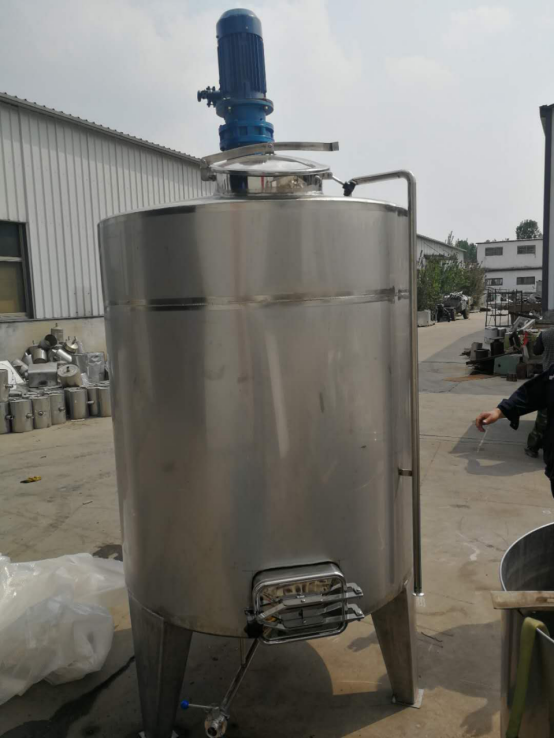全自動釀酒設備廠家發現冬天由于氣溫低,自然界的酵母菌、霉菌及有益的釀酒微生物數量少,入窖的酒醅在冬天難以升溫,使之在低溫狀況發酵,微生物的成長。
Fully automatic brewing equipment manufacturers found that due to the low temperature in winter, natural yeasts, fungi and beneficial microorganisms in the brewing are few, and the fermented grains in cellars are difficult to warm up in winter, making them ferment at low temperature and the growth of microorganisms.
繁衍及代謝遭到按捺,加之門窗等加以密封,室內通風不良,導致酒醅的排潮、排酸不暢等許多因素,也相同影響窖池正常發酵,為確保冬天出產產品和質量安穩,全自動釀酒設備廠家以為冬天釀酒應注意以下幾點:
Propagation and metabolism are controlled, doors and windows are sealed, and indoor ventilation is poor, which leads to many factors such as wet and acid drainage of fermented grains. They also affect the normal fermentation of pits. In order to ensure the stability of products and quality in winter, the manufacturers of automatic brewing equipment think that the following points should be paid attention to in winter brewing:
1. 進步入池溫度
1. Progressive Pool Entry Temperature
在正常狀況下,入窖溫度高低決定了發酵速度和頂火溫度。操控好入池溫度,把握住窖池的升溫狀況,才能習慣微生物的成長代謝,因而,冬天氣溫低,在晾醅和加曲拌種時稍有時間延誤。
Under normal conditions, the pit entry temperature determines the fermentation speed and top-fire temperature. Only when the temperature of the pit is well controlled and the temperature of the pit is well controlled can we get used to the growth and metabolism of microorganisms. Therefore, in winter, the temperature is low and there is a slight delay in drying, starching and seed mixing.
醅溫就會很快下降,若溫度低于13℃時,霉菌的糖化效果,酵母菌的發酵效果都將遭到按捺,升溫過慢,起伏小,達不到頂火溫度,出酒率就低,因而,選用進步入池溫度2-3℃,搶溫入池來確保酒醅處于佳發酵狀況。
Grains temperature will drop quickly. If the temperature is lower than 13 C, the saccharification effect of mould and the fermentation effect of yeast will be suppressed. The fermentation effect of yeast will be controlled too slowly, the fluctuation is small, and the rate of liquor production will be low if the top fire temperature is not reached. Therefore, the improved temperature of entering the pond is 2-3 C and the temperature of entering the pond is rushed to ensure that the fermentation of grains is in the best condition.
2. 添加入池淀粉濃度
2. Pool starch concentration
在白酒的出產過程中,淀粉是發酵過程基本的物質。為滿足冬天酒醅發酵過程中有足夠的熱量,選用進步入池淀粉濃度的辦法,來進步微生物的活動能力。通過實驗比較以為淀粉濃度一般把握在19~21%,糧醅比操控在1∶4.0-4.5較為適合,從而確保產品出酒率。
Starch is the most basic substance in the production of white wine. In order to meet the requirement of sufficient heat in fermentation of fermented grains in winter, the method of improving the concentration of starch in the pond was selected to improve the activity of microorganisms. The results showed that the starch concentration was 19-21% and the ratio of grains to grains was 1:4.0-4.5, which ensured the liquor yield.

3. 加大用曲量
3. Increase the use of koji
在發酵過程中,大曲是一種多種微生物聚集的粗酶制劑。由于入冬后添加了投料,淀粉含量相應進步,為保證糖化發酵的有用進行,就必須添加大曲用量以滿足發酵需求,進步幅應在3~5%之間為宜。
In the fermentation process, Daqu is a crude enzyme preparation gathered by many kinds of microorganisms. Because of the addition of starch after winter, the starch content improved accordingly. In order to ensure the usefulness of saccharification and fermentation, the amount of Daqu must be added to meet the fermentation demand, and the improvement should be between 3% and 5%.
4. 操控入池水分
4. Manipulate the water entering the pond
考慮到冬天氣溫低,水分蒸發少,況且使用的大都是當年的新糧食,含水分較大,必須對岀窖水分進行化驗檢測,酌情用水,不可盲目硬行添加。在正常狀況下,若水分過大,酒醅發粘,空隙度小,醅中含氧量就小,兼氧性的酵母菌不能成長、繁殖。因而,入池水分一般應在54~56%為宜。
Considering the low temperature and less evaporation of water in winter, and the use of most of the new grain of the year, the moisture content is relatively large, we must test the water in the pit, and use water as appropriate, not blindly add it. Under normal conditions, if the water content is too large, the grains are sticky, the voids are small, the oxygen content in the grains is small, and facultative yeasts can not grow and reproduce. Therefore, the water content in the pond should generally be 54-56%.
5. 適當添加酒醅酸度
5. Added acidity of fermented grains appropriately
冬天是釀酒行業的高產時節,但若醅中酸度過低,則影響酸醇酯化,使酒體香味欠濃,甚主體香味不杰出。
Winter is a high-yielding season in the brewing industry, but if the acidity of grains is too low, it will affect the esterification of acids and alcohols, so that the wine body fragrance is not strong, and even the main body fragrance is not outstanding.
這是由于低溫緩慢發酵升酸起伏小,產酒不正常,在發酵的大部分過程中,堅持高酒度和適當的酸度,對產酯有著重要效果,也利于下排出產,因而考慮糧醅增酸,一般入池酸度操控在1.2~1.7之間較為適合。
This is due to the low temperature slow fermentation acid fluctuation is small, the production of alcohol is abnormal, in most of the fermentation process, adhere to high alcohol content and appropriate acidity, has an important effect on ester production, but also conducive to the discharge of production. Therefore, considering the increase of acid in grains, acidity control in general between 1.2 to 1.7 is more suitable.
Above information is our vending machine to organize and publish the hope to help you all on our website is: http://kadai88.com/!

 自動售酒機 2024-07-25
自動售酒機 2024-07-25  不銹鋼酒桶:關于酒桶你需要知道的一切 2024-07-19
不銹鋼酒桶:關于酒桶你需要知道的一切 2024-07-19  不銹鋼釀酒桶大解析! 2024-07-13
不銹鋼釀酒桶大解析! 2024-07-13  不銹鋼酒罐的產品概述及特點 2024-06-13
不銹鋼酒罐的產品概述及特點 2024-06-13  大型釀酒設備有哪些組成? 2024-06-10
大型釀酒設備有哪些組成? 2024-06-10  自動售酒機的產品特點 2024-06-07
自動售酒機的產品特點 2024-06-07  白酒釀酒設備知識介紹 2024-06-04
白酒釀酒設備知識介紹 2024-06-04  全自動涼茬機的使用故障有哪些? 2024-05-24
全自動涼茬機的使用故障有哪些? 2024-05-24  不銹鋼內膽實木酒桶:木酒桶如何儲存葡萄酒? 2024-05-23
不銹鋼內膽實木酒桶:木酒桶如何儲存葡萄酒? 2024-05-23  自動售酒機有哪些功能 2024-05-22
自動售酒機有哪些功能 2024-05-22  全自動涼茬機的工藝流程以及組成 2024-05-21
全自動涼茬機的工藝流程以及組成 2024-05-21  不銹鋼內膽實木酒桶:不銹鋼材質的優勢 2024-05-20
不銹鋼內膽實木酒桶:不銹鋼材質的優勢 2024-05-20